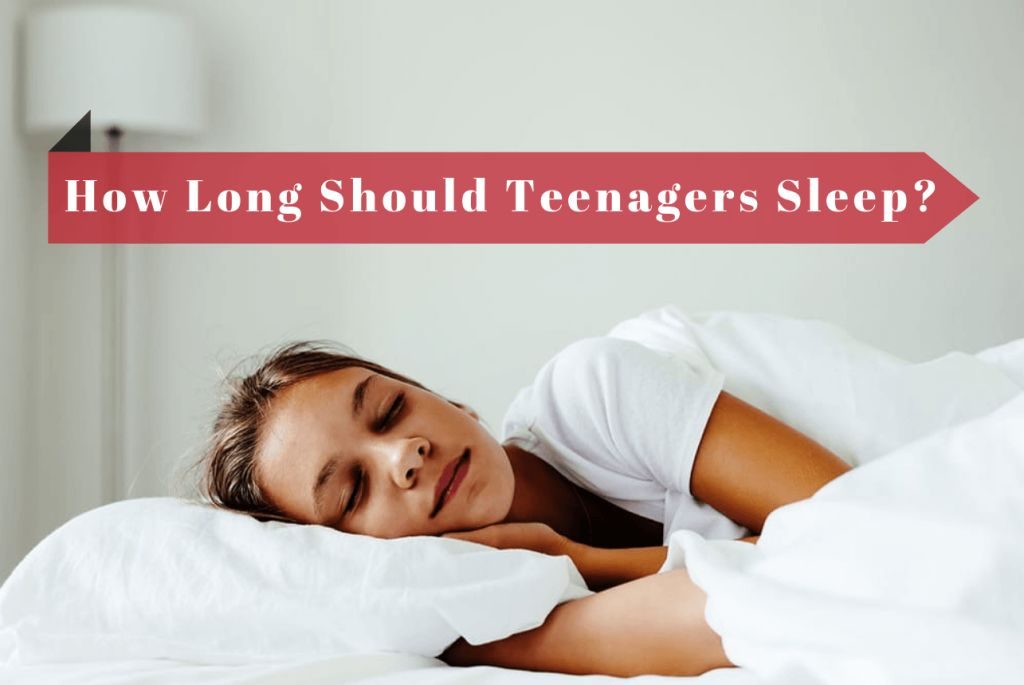The sleep pattern of teenagers is very different from that of the adults or younger kids. All of us know, that one adolescent who stays up late and then falls asleep in class. According to the sleep research, a teenager needs eight to ten hours of sleep every night.
The body’s circadian rhythm is reset during the teen years due to which the person falls asleep later and hence, wakes up later. All thanks to the brain hormone melatonin for this, which releases later at night for teens. But also, there’s so much for them teens to do during these years, for instance, studying hard to do well in school, other activities, using electronics, part-time jobs and what not. All of this makes it a little hard for them to fall asleep.
There can be a number of factors that may be responsible for not getting enough sleep, as we have discussed above. We will now discuss them in detail. Let’s read below:
Read More: 11 Herbs to Ensure Good Sleep to Your Teenager
Teenagers and Sleep: How Much Sleep Is Enough?
Shift in Sleep Schedule
There is a biological shift in an adolescent’s internal clock of about 2 hours after puberty. Basically, this means that if your teen used to fall asleep at 10:00 PM, he/she will now find it hard to fall asleep until 12:00 PM. Consequently, the same issue will be faced in the morning when they have to wake up.
Social and School Obligations
A number of factors like sports, after-school activities, homework and socialising can all cause late bedtime.
Read More: 7 Reasons for Poor Sleep Quality in Adolescence
Early School Start Time
A number of schools start as early as 7:00 AM in the morning. This means that your teen will have to wake up as early as 5:00 AM in the morning whether he/she had 7-8 hours of sleep or not.
Why is Sleep Important?
Sleep is, without any doubt, the first most important thing to be at your best. It:
- Improve athletic performance
- Be healthy
- Grow and develop mentally
- Pay attention and learn in school
On the other side, people with ongoing sleep deficits can have a number of problems, including:
- Trouble fighting infections
- Emotional problems, like depression
- Health problems, like heart disease and obesity
Is Your Teen Getting Enough Sleep?
In case, you are facing any of the below mentioned issues, it indicates that you need to add more sleep hours.
- If you have trouble concentrating
- Feel moody, sad, depressed or irritable
- Fall asleep during classes
- find it hard to wake up in the morning
Read More: Tips on Handling Sleep Problems In infants
How Can You Get More Sleep?
Here are a few tips that can help you to sleep better:
Exercise Regularly
Regular exercising is not only important for your physical health but mental health as well. Exercising on a regular basis will help you sleep better. However, do not exercise right before your bedtime as that can otherwise interrupt your good night’s sleep.
Avoid Caffeine
Beverages with caffeine like tea, soda, coffee etc should be avoided after the dinner. In addition to this, nicotine and alcohol also have an adverse effect on one’s sleep pattern.
Keep the Lights Low
Stay away from bright lights as that signals your brain that it’s time to wake up. Make sure you keep them low, including the phone screens as well. You can meditate or listen to soothing music that will help your body to relax.
Set a Pattern
Set a sleep schedule and make sure you stick to it. Over the time, your body will adapt to it
Don’t Nap Too Much
A short nap during the daytime is of no harm until it exceeds 30-40 minutes. this will make otherwise disrupt your sleep pattern and keep you away from sleeping later.
Turn Off Electronics
Keep all your electronics, including your phone, tablet, laptop away at least an hour before you go to bed.
Right Sleeping Environment
You can make use of nature sounds or white-noise machine (or application) that will help you relax by blocking out a noisy environment. Also, a little cooler temperature will provide for a better sleep.
Contact Your Teenager’s Doctor
It is recommended to speak to your adolescent’s physician if he/she faced difficulty falling asleep, seems excessively sleepy during the day or snores.
Conclusion
Getting inadequate sleep can lead to problems with memory, creativity and attention, all of which are important in these years as well as in later life. In addition to this, you must also ensure that your teen avoids recreational drugs like alcohol, tobacco etc as that is not only detrimental to their health but also leads to a poor sleep.
Reference
https://www.betterhealth.vic.gov.au/health/healthyliving/teenagers-and-sleep
https://www.nationwidechildrens.org/specialties/sleep-disorder-center/sleep-in-adolescents













